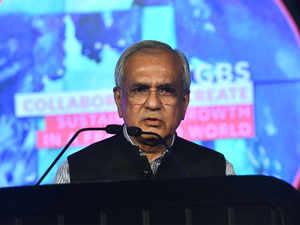
Niti Aayog vice chairman Rajiv Kumar NEW DELHI: The RBI measures will revive credit flow by commercial banks and targeted long-term repo operation (LTRO) would further activate the corporate bond market and also provide much needed liquidity to NBFCs, Niti Aayog vice chairman Rajiv Kumar said on Friday.
The RBI on Friday further eased bad-loan rules, froze dividend payment by lenders and pushed banks to lend more by cutting the reverse repo rate by 25 basis points, as it unveiled a second set of measures to support the economy hit hard by coronavirus-led slowdown.
“Kudos to the government and RBI for announcing another bazoka like package for reviving up credit activity by commercial banks and also by NABARD. The targeted LTRO will further activate the corporate bond market and also provide much needed liquidity to NBFCs.
“The government true to his word on doing what it takes to address the crisis brought on by the coronavirus pandemic,” Kumar said in a series of tweets.
LTRO is a tool which central bank uses to offer money to banks for a period of one to three years at the prevailing repo rate. The banks in turn offer government securities with same or higher tenure as a collateral to the central bank.
The Niti Aayog vice chairman also pointed out that forward guidance by the government and RBI indicates a softening inflationary outlook that will provide needed space for monetary policy to act in case further action is needed to bring the economy back on track.
In his second televised address since the nationwide lockdown began from March 25, Reserve Bank of India (RBI) Governor Shaktikanta Das pledged to boost liquidity and expand bank credit.
Niti Aayog CEO Amitabh Kant also welcomed the announcements made by the RBI and said extremely constructive and positive second set of interventions by RBI Governor Shaktikanta Das to address financial impact of COVID-19 pandemic.
“Accurate assessment of conditions and immediate prognosis by him. Right-sized help to pain points and will help improve liquidity in economy,” Kant said.
Source: indiatimes.com

